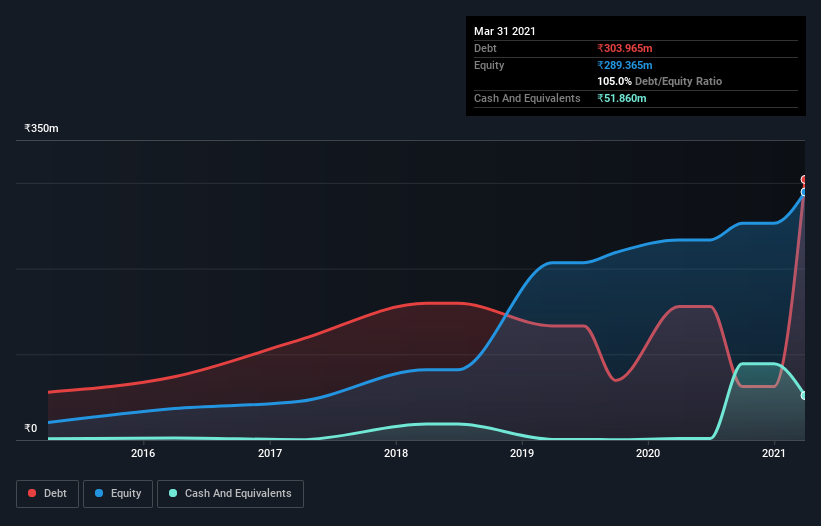
Some say volatility, rather than debt, is the best way to think about risk as an investor, but Warren Buffett famously said that 'Volatility is far from synonymous with risk.' When we think about how risky a company is, we always like to look at its use of debt, since debt overload can lead to ruin. We note that Bombay Super Hybrid Seeds Limited (NSE:BSHSL) does have debt on its balance sheet. But should shareholders be worried about its use of debt?
What Risk Does Debt Bring?
Generally speaking, debt only becomes a real problem when a company can't easily pay it off, either by raising capital or with its own cash flow. Part and parcel of capitalism is the process of 'creative destruction' where failed businesses are mercilessly liquidated by their bankers. While that is not too common, we often do see indebted companies permanently diluting shareholders because lenders force them to raise capital at a distressed price. Of course, debt can be an important tool in businesses, particularly capital heavy businesses. The first step when considering a company's debt levels is to consider its cash and debt together.
View our latest analysis for Bombay Super Hybrid Seeds
What Is Bombay Super Hybrid Seeds's Net Debt?
You can click the graphic below for the historical numbers, but it shows that as of March 2021 Bombay Super Hybrid Seeds had ₹304.0m of debt, an increase on ₹155.8m, over one year. However, it also had ₹51.9m in cash, and so its net debt is ₹252.1m.

How Healthy Is Bombay Super Hybrid Seeds' Balance Sheet?
According to the last reported balance sheet, Bombay Super Hybrid Seeds had liabilities of ₹404.5m due within 12 months, and liabilities of ₹33.0m due beyond 12 months. Offsetting this, it had ₹51.9m in cash and ₹74.9m in receivables that were due within 12 months. So it has liabilities totalling ₹310.8m more than its cash and near-term receivables, combined.
Of course, Bombay Super Hybrid Seeds has a market capitalization of ₹2.17b, so these liabilities are probably manageable. However, we do think it is worth keeping an eye on its balance sheet strength, as it may change over time.
In order to size up a company's debt relative to its earnings, we calculate its net debt divided by its earnings before interest, tax, depreciation, and amortization (EBITDA) and its earnings before interest and tax (EBIT) divided by its interest expense (its interest cover). This way, we consider both the absolute quantum of the debt, as well as the interest rates paid on it.
Bombay Super Hybrid Seeds has a debt to EBITDA ratio of 3.0 and its EBIT covered its interest expense 5.4 times. This suggests that while the debt levels are significant, we'd stop short of calling them problematic. It is well worth noting that Bombay Super Hybrid Seeds's EBIT shot up like bamboo after rain, gaining 60% in the last twelve months. That'll make it easier to manage its debt. There's no doubt that we learn most about debt from the balance sheet. But it is Bombay Super Hybrid Seeds's earnings that will influence how the balance sheet holds up in the future. So if you're keen to discover more about its earnings, it might be worth checking out this graph of its long term earnings trend.
Finally, a business needs free cash flow to pay off debt; accounting profits just don't cut it. So we clearly need to look at whether that EBIT is leading to corresponding free cash flow. Over the last three years, Bombay Super Hybrid Seeds saw substantial negative free cash flow, in total. While that may be a result of expenditure for growth, it does make the debt far more risky.
Our View
Bombay Super Hybrid Seeds's conversion of EBIT to free cash flow was a real negative on this analysis, although the other factors we considered were considerably better. In particular, we are dazzled with its EBIT growth rate. Looking at all this data makes us feel a little cautious about Bombay Super Hybrid Seeds's debt levels. While we appreciate debt can enhance returns on equity, we'd suggest that shareholders keep close watch on its debt levels, lest they increase. There's no doubt that we learn most about debt from the balance sheet. But ultimately, every company can contain risks that exist outside of the balance sheet. For instance, we've identified 4 warning signs for Bombay Super Hybrid Seeds (2 are a bit unpleasant) you should be aware of.
If, after all that, you're more interested in a fast growing company with a rock-solid balance sheet, then check out our list of net cash growth stocks without delay.
If you’re looking to trade Bombay Super Hybrid Seeds, open an account with the lowest-cost* platform trusted by professionals, Interactive Brokers. Their clients from over 200 countries and territories trade stocks, options, futures, forex, bonds and funds worldwide from a single integrated account. Promoted
Valuation is complex, but we're here to simplify it.
Discover if Bombay Super Hybrid Seeds might be undervalued or overvalued with our detailed analysis, featuring fair value estimates, potential risks, dividends, insider trades, and its financial condition.
Access Free AnalysisThis article by Simply Wall St is general in nature. It does not constitute a recommendation to buy or sell any stock, and does not take account of your objectives, or your financial situation. We aim to bring you long-term focused analysis driven by fundamental data. Note that our analysis may not factor in the latest price-sensitive company announcements or qualitative material. Simply Wall St has no position in any stocks mentioned.
*Interactive Brokers Rated Lowest Cost Broker by StockBrokers.com Annual Online Review 2020
Have feedback on this article? Concerned about the content? Get in touch with us directly. Alternatively, email editorial-team (at) simplywallst.com.
About NSEI:BSHSL
Bombay Super Hybrid Seeds
Engages in the research, production, processing, and marketing of hybrid and GM seeds in India.
Excellent balance sheet with proven track record.
Similar Companies
Market Insights
Community Narratives



